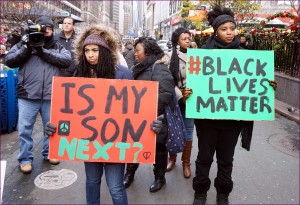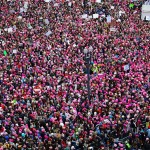 I wrote the following piece which was first published in the Jacksonville Journal-Courier, my local newspaper, last week.
I wrote the following piece which was first published in the Jacksonville Journal-Courier, my local newspaper, last week.
When I saw a cluster of white police officers marching up to my neighbor’s house in military fatigues and helmets with large guns at the ready, my first instinct was to grab my camera and take a picture out the kitchen window. I started shooting video as they entered the house, ran around the back, and shepherded the small children who had been playing on the porch just a few minutes earlier out into the yard.
I soon stopped the recording. In many ways, nothing of note happened, other than someone later being taken away in handcuffs and charged with drug possession.
Yet the fact that my instinct was to record what I saw on camera stems almost entirely from an understanding of the problems built in to militarized and overzealous policing. It comes from the fact that we have recently seen example after example of white police officers failing to de-escalate encounters with black citizens, too often ending in the death of those citizens: Sandra Bland, Samuel DuBose, Freddie Gray, Eric Garner, and too many more.
I don’t want to mistrust the police. As a person who benefits from white privilege, I don’t have to. I was raised believing I could and should trust law enforcement. I don’t have to worry about being unfairly targeted while I’m driving or while I’m sitting in my living room. And yet because we have so many examples of blacks being mistreated, unfairly targeted, shot, harassed and otherwise abused by some in law enforcement, my instinct now is to protect my neighbor and turn on my camera.
Earlier this month, Gov. Bruce Rauner signed what is being described as the most sweeping body camera legislation in the country. It sets statewide standards for the use of body cameras by police, increases officer training and education around the use of force, and requires independent investigations for any officer-related deaths. It doesn’t require the use of cameras by every police department, but it does spell out what needs to happen when they are used.
Most analysis suggests that police body cameras are not going to solve the problems of mistrust between police and black citizens. The roots and reasons for that are deep and complicated and wrapped up in the distinctive social and political history of this country. Ferguson erupted last year not only because of the death of Michael Brown, but because of the hundreds of years of U.S. racial history preceding it. Los Angeles burned in 1992 not only because of the Rodney King verdict, but because of generations of trauma caused by institutional racism. Race riots in Detroit in 1943 and 1967 bubbled up from long-standing systemic disadvantages based on race and class. And the Springfield race riot in 1908 wasn’t only about the arrests of two black men, it was about white fear and anxiety bred by mistrust and prejudice of the other.
The Black Lives Matter movement today is the latest generation of protest and prophecy. It has to exist because of the centuries and generations that have proclaimed in big and small ways that some lives do not, in fact matter. It has to exist because we have to be honest about our past and our present.
It has to exist because I’m less worried about a neighbor’s drug use than I am about six or eight militarized police officers marching into their house with large weapons at the ready.
Image via wikimedia commons.












